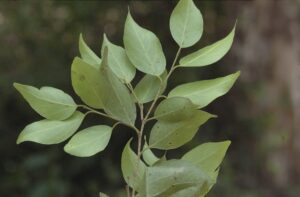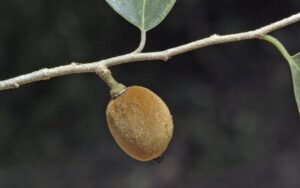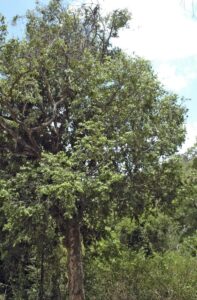- Species
- Drypetes porteri
Drypetes porteri

Where is this tree found?
Drypetes porteri, known as ‘Agil’ in Tamil, is a small tree which inhabits the remote, rocky evergreen tropical forests of Tamil Nadu, southern India. It is endemic to India, being found in no other country in the world. The largest known population of this tree is in the Pakkamalai Reserve Forest (located in the Eastern Ghats) – an area of extraordinary plant and animal biodiversity. It also lives in the Magamalai Wildlife Sanctuary (located in the Western Ghats).
Why save this tree?
The remaining population of this species is very small – only around 8,000 individuals in the wild. Pakkamalai Reserve Forest is home to the largest population, roughly 5,000 individuals, while Megamalai Wildlife Sanctuary is home to approximately 3,000 individuals. The small population and narrow distribution make this species particularly vulnerable, especially considering the threats which it faces from animal grazing which hinders regeneration around mature trees, over-harvesting of the edible fruits for animal fodder and the unsustainable harvest of the wood by local craftsmen.
A new population was recently discovered in Pakkamalai Reserve Forest in 2001, which is geographically isolated from where the species was first recorded in the Western Ghats over a hundred years ago. Due to differences in leaf morphology it is still unclear whether this population is an entirely new species or a sub-species – a question that will hopefully be answered by further investigation. Pakkamalai Reserve Forest also contains the largest known populations of Critically Endangered Hildegardia populifolia (endemic to south India) and two recently discovered species: Huberantha senjiana and Cordia ramanujamii.
Saving this species will preserve a valuable source of animal fodder, timber for local craftsmen who produce combs and other wooden items, and provide employment opportunities within the conservation plan as forest guides, plant nursery employees and seasonal labour for plantation programmes.
How to save this species
It is important that extensive population surveys and searches for other extant populations are carried out to discover the true extent of the species and to develop a species recovery plan in order to raise the conservation profile of D. porteri at the local, regional and national level. Education and outreach programmes will raise the awareness of the need to protect this species and of the importance of conservation in general.
The establishment of nursery protocols and genetically representative ex situ collections at Auroville Botanic Gardens and at other institutes across Southern India will give this species insurance against being lost in the wild and facilitate more conservation actions. Beyond this, it’s important for the long term survival of the species in the wild that in situ plantings are carried out in collaboration with relevant landowners (e.g. Forest Department of Tamil Nadu) to bolster the wild population.
A systematic, cost-effective, and rational approach
- Population surveys
- Develop a species recovery plan
- Develop nursery protocols
- In situ plantings
- Ex situ plantings
- Education and outreach programme
Partners for Drypetes porteri

Sponsors for Drypetes porteri







